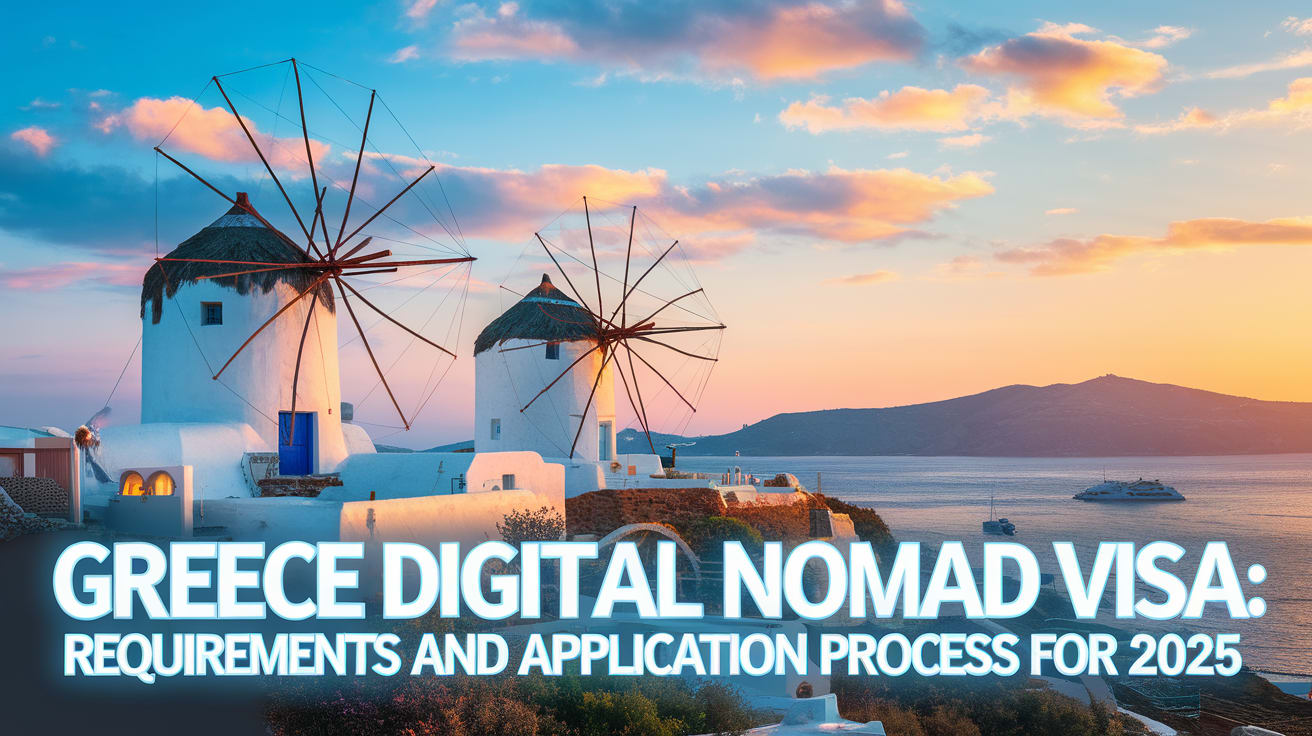Greece Digital Nomad Visa 2025
According to Wikipedia, the digital nomad movement has fundamentally reshaped how professionals view the intersection of work and life, and few countries...

Your 2025 Guide to the Greece Digital Nomad Visa
Authority Insight: We grounded this article in guidance from Wikipedia and Bbc so every recommendation reflects the latest policy and on-the-ground expertise for Greece Digital Nomad Visa 2025.
According to Wikipedia, the digital nomad movement has fundamentally reshaped how professionals view the intersection of work and life, and few countries have embraced this shift as enthusiastically as Greece. Imagine swapping your dreary home office for a sun-drenched balcony overlooking the Aegean Sea, your lunch break for a quick dip in turquoise waters, and your evening commute for a stroll through ancient, cobblestoned streets. This isn't just a daydream; for thousands of remote workers, it's a reality made possible by the Greek Digital Nomad Visa. This program isn't just an invitation to visit; it's a structured pathway to live and work legally from one of the world's most beautiful and historic countries, all while enjoying significant financial and lifestyle benefits. If you've ever considered making this leap, 2025 is the year to understand exactly how this visa can turn your remote work fantasy into a tangible plan.

What is the Greece Digital Nomad Visa?
The Greece Digital Nomad Visa, officially established under Law 4825/2021, is a long-stay residence permit specifically designed for non-EU/EEA citizens who can work independently of location. It allows you to legally reside in Greece for up to two years initially, with the possibility of renewal, as long as you work for clients or an employer based outside of Greece. This is the critical distinction: you are bringing foreign income into the Greek economy without taking a job from the local market. As discussions on expat forums like those on Expatica frequently highlight, this visa is not a work permit for Greek companies.
Why does this matter in 2025? The global remote work landscape is more competitive than ever. Countries are vying for top talent, and Greece has positioned itself aggressively with a compelling offer. The program combines a relatively straightforward application process with one of Europe's most attractive tax incentives—a potential 50% reduction in income tax for seven years. For digital nomads, freelancers, and remote employees earning a stable income, this visa represents a golden ticket to a higher quality of life, lower cost of living compared to other Western European hubs, and a significant financial advantage. It’s for the software developer tired of the Silicon Valley grind, the freelance writer seeking inspiration, or the marketing consultant who wants to manage global campaigns from a base in Athens or Crete. Similar to the Italy Digital Nomad Visa, this visa offers competitive benefits.
What You'll Learn in This Guide
Navigating international bureaucracy can be daunting, but this guide is designed to be your comprehensive roadmap. We'll cut through the legal jargon and provide clear, actionable steps to help you successfully apply for and thrive with your Greek Digital Nomad Visa in 2025.
Here’s what we will cover:
- Eligibility & Requirements: A detailed breakdown of the exact income thresholds, proof of remote work, health insurance standards, and other essential criteria you must meet.
- The Step-by-Step Application Process: From gathering documents in your home country to your appointment at the Greek consulate and the final steps once you arrive in Greece.
- The 50% Tax Incentive Explained: We'll demystify how the tax break works, who qualifies, and how to apply for this lucrative benefit.
- Choosing Your Greek Home: An overview of the most popular and practical locations for digital nomads, from the vibrant capital of Athens to the idyllic islands.
- Life in Greece: Practical advice on banking, housing, healthcare, and integrating into the local culture.
- Common Pitfalls & Pro Tips: Learn from the experiences of others to avoid common mistakes that can delay or derail your application.
Background: Why Greece Wants You
The launch of the Digital Nomad Visa was a strategic move to attract high-earning, location-independent professionals who can contribute to the economy without taking jobs from the local workforce. To ensure the program attracts the right candidates and that they can comfortably support themselves, the government has established a clear set of criteria that all applicants must meet.
Greece Digital Nomad Visa: Requirements & Application Process for 2025

Navigating the path to becoming a digital nomad in Greece is an exciting prospect, and understanding the specific requirements is the first crucial step. The Greek government has streamlined a process designed to attract remote professionals. Unlike a standard tourist visa, this long-stay visa (Type D) and subsequent residence permit allow you to live and work legally in the country for a foreign employer or your own foreign-based business.
Your Essential Checklist: Meeting the Visa Requirements
To qualify for the Greece Digital Nomad Visa, you must be a non-EU/EEA/Swiss citizen who can perform your work remotely using technology. The core of your application will be proving your status as a remote worker and your financial stability. If you're considering other European destinations, check out the Portugal Digital Nomad Visa.
Eligibility and Financial Thresholds
The Greek government needs to see that you can support yourself without taking a job in the local market.
- Primary Income Requirement: You must demonstrate a stable net monthly income of at least €3,500 after taxes. This is a firm threshold.
- Family Add-Ons: You can bring your family, but the income requirement increases.
- For a spouse or registered partner, the amount increases by 20% (an additional €700/month).
- For each child, the amount increases by 15% (an additional €525/month per child).
- Proof of Funds: This income must come from sources outside of Greece. You'll need to provide bank statements, employment contracts, or client invoices to substantiate your claim.
Required Documentation
Gathering your documents is the most time-intensive part of the process. Ensure everything is translated into Greek (if necessary) and properly authenticated with an Apostille stamp where required.
- Valid Passport: Must be valid for the duration of the visa and have at least two blank pages.
- Application Form: Completed and signed. You can usually download this from the Greek consulate's website in your home country.
- Letter of Intent: A signed declaration stating your intent to live in Greece, work remotely, and not seek employment from a Greek-based company.
- Proof of Remote Work: This can be an employment contract for remote work, client agreements, or documents proving you own a foreign-registered business.

While the list of required documents seems straightforward on paper, the reality of compiling a successful application involves navigating a complex bureaucratic landscape. Knowing the official requirements is just the first step; understanding how to execute the process efficiently is what separates a smooth transition from a frustrating one.
Practical Guide: Your Greek Digital Nomad Journey

Embarking on a new life in Greece is an exciting prospect, but navigating the visa process requires preparation and a bit of insider knowledge. This practical guide breaks down the steps, costs, and real-world experiences to help you make your Hellenic dream a reality.
Expert Tips & Best Practices
Moving to a new country always has a learning curve. Here are some proven strategies to make your application process for the Greek Digital Nomad Visa as smooth as possible.
- Hire a Local Lawyer: This is the single most important tip. The Greek bureaucracy can be complex and slow. A good immigration lawyer in Greece will save you immense time and stress. They know the exact document formats, can communicate with the authorities on your behalf, and will help you secure the essential Greek Tax Number (AFM) and open a local bank account, which are prerequisites for the residency permit stage.
- Front-load Your Paperwork: Gather, translate, and apostille everything before you even think about booking an appointment. Official translations must be done by a lawyer or a certified translator recognized by the Greek state. Getting an Apostille stamp for documents like your birth certificate and criminal record check can take weeks, so start early.
- Proof of Income is Paramount: Your documents must clearly and consistently show a stable monthly income of at least €3,500 (after tax). Use official bank statements, client contracts, and employment letters. Ensure the name on these documents perfectly matches your passport. If you're a freelancer with fluctuating income, provide statements for a longer period (e.g., 6-12 months) to demonstrate a stable average.
- The "Blue Paper" is Your Best Friend: Once you arrive in Greece and apply for the residence permit, you'll receive a temporary certificate, often called the "Blue Paper." This document proves your legal status while you wait for the official permit card. Guard it carefully, as it allows you to live and operate in Greece legally. Recent reports, including some from the BBC, have highlighted the influx of remote workers, putting pressure on administrative systems, so expect this waiting period to be several months long. For a similar visa program, see our comprehensive Malta Digital Nomad Visa guide.
Real-World Scenarios
Theory is great, but let's look at how this plays out for real people.
Case Study 1: The Successful Solo Developer
- Profile: Sarah, a 32-year-old freelance software developer from Austin, Texas.
- What She Did Right: Sarah hired a lawyer in Athens three months before her intended move. She meticulously organized her finances, showing an average monthly income of over €5,000 through client contracts and 12 months of bank statements. Her lawyer pre-vetted all her documents. Upon arrival, she had appointments already scheduled to get her tax number and open a bank account. She secured a one-year lease on an apartment in the Pangrati neighborhood after viewing places on Spitogatos, a popular Greek real estate site.
- Lesson Learned: The investment in a lawyer paid for itself in peace of mind. By having everything perfectly prepared, her residence permit application was submitted within two weeks of her arrival, and she received her "Blue Paper" without any issues, allowing her to settle in quickly. You might also be interested in our guide to the Portugal D7 visa passive income.
Case Study 2: The Couple Who Underestimated Bureaucracy
- Profile: Mark and Chloe, a married couple from Canada who both work remotely.
- What They Did Wrong: To save money, they attempted the entire process themselves. They used a standard online service for translations, which were later rejected by the Greek authorities for not being officially certified. Their proof of combined income was also confusing, mixing freelance invoices with company pay stubs without a clear summary letter.
- Lesson Learned: Their application was delayed by nearly three months as they scrambled to get documents re-translated and re-submitted. They eventually hired a lawyer to resolve the issues, costing them more in time, rent, and stress than if they had from the start. Their story is a common cautionary tale about the value of expert local guidance.
Further Reading & Sources
- En.Wikipedia.Org – Portugal
- En.Wikipedia.Org – Travel Visa
- Bbc.Com – News
- En.Wikipedia.Org – Digital Nomad
- Getgoldenvisa.Com – Portugal Golden Visa Program
- Globalresidenceindex.Com – Portugal Golden Residency
- Nomadgate.Com – Portugal Golden Visa Guide
- Portugalcitizenship.Org – Portugal Golden Visa
- En.Wikipedia.Org – Portugal Golden Visa
- Portugalpathways.Io – Definitive Guide For Portugals Golden Visa In 2025
- Henleyglobal.Com – Portugal
- Getgoldenvisa.Com – Constitutional Concerns Surround Portugals Citizenship Proposal
- Goldenvisas.Com – Portugal
- Wise.Com – Portugal Golden Visa
- Nomadcapitalist.Com – Portugal Golden Visa
Final Reminder: Stay compliant with greece digital nomad visa cost to protect your move.